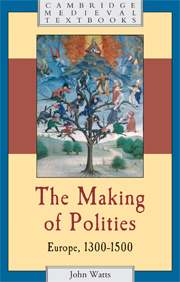2 - Europe in 1300: the political inheritance
Published online by Cambridge University Press: 05 June 2012
Summary
The thirteenth century has commonly been seen as an age of culmination, even ‘completion’, or ‘perfection’. It is not hard to see why. It was in this century that the principal developments of the expanding society of the high middle ages gained a kind of cohesion, or fruition, or maximum extent. In population, and more or less in territory, Latin Christendom arrived at the limits of its medieval expansion, while the papal monarchy was at the height of its powers, and the basic framework of the pre-Tridentine church was laid down in the decrees of the Fourth Lateran Council (1215). The Summa Theologiae (1266–72) of Thomas Aquinas brought scholastic research to a point of coherence by synthesising Aristotelian philosophy with Christian theology; Accursius produced the essential guide to Roman law in the work that came to be known as the Glossa Ordinaria (1220×40); and the codification of canon law, the law of the Church, approached conclusion in two classic collections: the Liber Extra of 1234 and the Liber Sextus of 1298. In the world of secular politics, meanwhile, kings like Edward I of England (1272–1307), Philip IV of France (1285–1314), James II of Aragon (1291–1327) and Alfonso X of Castile (1252–84) appeared to preside over embryonic nation states, bound together by overarching royal jurisdiction, networks of officers, notions of community and ethnicity, and experimental media of consultation and taxation.
- Type
- Chapter
- Information
- The Making of PolitiesEurope, 1300–1500, pp. 43 - 157Publisher: Cambridge University PressPrint publication year: 2009



